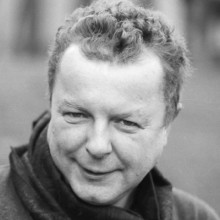Polish literature

Tadeusz Pióro
Born in Warsaw in 1960, he is a poet, prose writer, columnist, literary historian and translator from English (of works including John Ashbery and James Schuyler’s A Nest of Ninnies and Harry Matthews’s Cigarettes, unfortunately in extracts only).
He has published four of his own collections of poetry, and has co-authored two more. In 1993 he gained his doctorate at the University of California at Berkeley (his thesis was on the works of James Joyce), and until 1997 he was a lecturer at the Southern Methodist University in Dallas. He is now a lecturer in the English faculty at Warsaw University. He is the editor of an American selection of poems by Tadeusz Borowski and also (with Rod Mengham and Piotr Szymor) of an English anthology of new Polish poetry, entitled Altered State (Arc Publications, Todmorden, 2003). He is editor of a literary and arts magazine called Dwukropek [Colon], and a regular contributor to Przekrój [Review] and Literatura na Świecie [Literature in the World, a journal of new writing from round the world]. He lives in Warsaw. Pióro started writing poetry fairly late, in the thirtieth year of his life, under the influence of poems by his friends Andrzej Sosnowski and Kuba Kozioł. Their joint collection, Dom bez kantów [House without Corners], issued in the USA, at once became legendary in Poland. Pióro’s first independent book, Okęcie [the name of Warsaw’s airport], also made quite a stir, becoming – alongside Sosnowski’s Życie na Korei [Life about Korea] – a vital counterpoint to the trend of “O’Hara-ism” that was prevalent in those days. This poet cultivates erudite, emotionally cool “literature made out of literature”; he does not hide his fascination with Ashbery and Pound (or with authors from the OuLiPo circle), but is also happy to “sample” from the Polish classics (such as Cyprian Norwid, Henryk Sienkiewicz or Maria Dąbrowska), whose recognisable structures supplement a deformed or quite absurd content, or else he creates literary collages out of extracts from them. He is happy to use sophisticated verse forms (such as the pantoum, the villanelle, or the sestina), and he is also the inventor of the “Kurpie cut-out” structure, i.e. the perfectly symmetrical poem. [Kurpie is a district of Warsaw, and “cut-out” refers to the Polish folk art form that involves making elaborate symmetrical patterns by folding and cutting paper.] His work is labelled “anti-biographical”, because all sorts of allusion to his personal life lie hidden deep within it, making them hard to decipher. For the critics, Pióro is a hard nut to crack – they can evaluate him, but they can’t analyse him. One of them said that “discussing Pióro’s poems ends in adapting them to one’s own tastes”. As a prose writer he is the author of one well-known story, Wyjaśnienie [The Explanation] (a fictional monologue by Michel Foucault’s Polish lover, who is spying on the philosopher for the secret service) and of some interesting prose of an oneiric nature. A special area of Pióro’s work is his cookery writing in Przekrój, where in his weekly column he promotes rare, exotic dishes that are difficult to prepare, and which some people claim do not actually exist. These recipes are really just another excuse for Pióro to show off his purely linguistic virtuosity. As a student of literature Pióro is chiefly interested in the political contexts of poetry, and has published numerous articles on this subject. His own poetry (apart from the poem Bez znieczulenia [Without anaesthetic], which describes a football championship using the terminology of war and genocide) is conspicuously apolitical. Complex and difficult to read, it rewards the effort with refined humour and lots of witty remarks, like the one in the poem entitled Bug Hour: “Love makes us suffer more than pornography”.
BIBLIOGRAPHY
- Dom bez kantów, Chicago: The Movable Feast Press 1992 (razem z Andrzejem Sosnowskim i Kubą Koziołem).
- Okęcie, Warszawa: Przedświt 1993.
- Wiersze okolicznościowe, Lublin: Stowarzyszenie Literackie Kresy 1997.
- Syntetyczność, Legnica: Centrum Sztuki – Teatr Dramatyczny 1998.
- Dom bez fantów, Legnica: Centrum Sztuki – Teatr Dramatyczny 1998 (razem z Andrzejem Sosnowskim i Fantomasem).
- Wola i Ochota, Legnica: Biuro Literackie Port Legnica 2000.
- Pieśń miłosna, Wrocław: Biuro Literackie, 2004.
- Abecadło, Wrocław: Biuro Literackie, 2009.
- O dwa kroki stąd, Wrocław: Biuro Literackie, 2011.
- Powązki, Wrocław: Biuro Literackie, 2015.